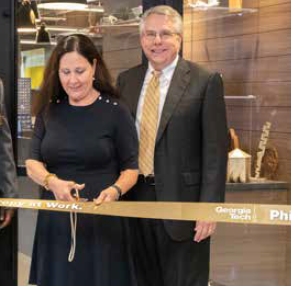‘MAGICAL’ MAKERSPACE
GETS EXTENSIVE REDESIGN AND A NEW NAME
The Flowers Invention Studio is where DIY meets engineering/design coursework. Staffed by student volunteers from various majors, the advanced makerspace enables other students, faculty, and staff to learn how to design and build the projects of their dreams — or a clock. Projects can be intricate or simple; the point is to learn by doing.
Thanks to a generous commitment from Beth and Fort Flowers, ME 1983, the makerspace has received a significant redesign makeover and the family’s name.
“This is a magical place,” said Amit Jariwala, director of Design and Innovation for the Woodruff School of Mechanical Engineering. “This is where the concept of makerspaces in higher education started almost 10 years ago.” With the Flowers’ generosity, the George W. Woodruff School of Mechanical Engineering was able “to work with some of the best architects and contractors to create a space that is functional, aesthetic, modern, and welcoming to everyone on campus,” said Jariwala. Students, in particular, will be able to take the theoretical principles they learn in class and apply them in a real-world, practical setting.
Beth and Fort Flowers had several reasons for supporting the makerspace.
“Number one, [recently retired Woodruff School Chair] Bill Wepfer asked, and based on his leadership and innovation as a faculty member and chair, when Bill makes an ask then we know it will be important and cutting edge,” said Fort Flowers. “Second, we have a family tradition in terms of engineering education: there are 22 engineering degrees in four generations of the Flowers family, and 16 of those are in mechanical engineering. We have always had a focus in our family philanthropy on design engineering,” said Flowers. Lastly, they want “to establish mechanical engineering facilities that are worthy of the first-rate group of students at Tech.”
The Flowers Invention Studio includes two dedicated work areas: a metal shop and The Hub – a large room boasting a fleet of 3D printers, laser cutters, electronics/robotics equipment, and sewing stations. Each area includes state-of-the-art equipment and the prerequisite safety gear. Trained student Prototyping Instructors (PIs) are on hand to teach people how to properly and safely use all the equipment.
According to Flowers, the opportunity to fund the invention studio was a perfect fit. “We have a family philanthropic focus on design engineering because we believe that design engineers make a difference,” he said.
